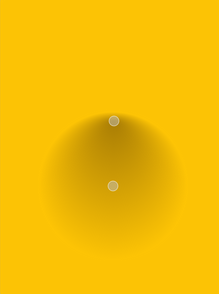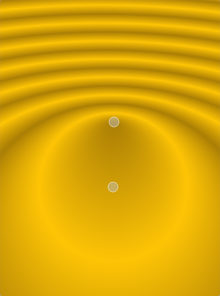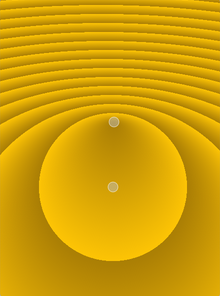- class QRadialGradient#
The
QRadialGradientclass is used in combination withQBrushto specify a radial gradient brush. More…Synopsis#
Methods#
def
__init__()def
center()def
centerRadius()def
focalPoint()def
focalRadius()def
radius()def
setCenter()def
setFocalPoint()def
setFocalRadius()def
setRadius()
Note
This documentation may contain snippets that were automatically translated from C++ to Python. We always welcome contributions to the snippet translation. If you see an issue with the translation, you can also let us know by creating a ticket on https:/bugreports.qt.io/projects/PYSIDE
Detailed Description#
Qt supports both simple and extended radial gradients.
Simple radial gradients interpolate colors between a focal point and end points on a circle surrounding it. Extended radial gradients interpolate colors between a focal circle and a center circle. Points outside the cone defined by the two circles will be transparent. For simple radial gradients the focal point is adjusted to lie inside the center circle, whereas the focal point can have any position in an extended radial gradient.
Outside the end points the gradient is either padded, reflected or repeated depending on the currently set
spreadmethod:


PadSpread(default)The colors in a gradient is defined using stop points of the
QGradientStoptype, i.e. a position and a color. Use thesetColorAt()or thesetStops()function to define the stop points. It is the gradient’s complete set of stop points that describes how the gradient area should be filled. If no stop points have been specified, a gradient of black at 0 to white at 1 is used.In addition to the functions inherited from
QGradient, theQRadialGradientclass provides thecenter(),focalPoint()andradius()functions returning the gradient’s center, focal point and radius respectively.See also
QLinearGradientQConicalGradientThe Gradients Example- __init__(center, centerRadius, focalPoint, focalRadius)#
Constructs an extended radial gradient with the given
center,centerRadius,focalPoint, andfocalRadius.- __init__(center, radius)
- Parameters:
center –
QPointFradius – float
Constructs a simple radial gradient with the given
center,radiusand the focal point in the circle center.See also
- __init__(center, radius, focalPoint)
Constructs a simple radial gradient with the given
center,radiusandfocalPoint.Note
If the given focal point is outside the circle defined by the
centerpoint andradius, it will be re-adjusted to lie at a point on the circle where it intersects with the line fromcentertofocalPoint.See also
- __init__(cx, cy, centerRadius, fx, fy, focalRadius)
- Parameters:
cx – float
cy – float
centerRadius – float
fx – float
fy – float
focalRadius – float
Constructs an extended radial gradient with the given center (
cx,cy), center radius,centerRadius, focal point, (fx,fy), and focal radiusfocalRadius.- __init__(cx, cy, radius)
- Parameters:
cx – float
cy – float
radius – float
Constructs a simple radial gradient with the center at (
cx,cy) and the specifiedradius. The focal point lies at the center of the circle.See also
- __init__(cx, cy, radius, fx, fy)
- Parameters:
cx – float
cy – float
radius – float
fx – float
fy – float
Constructs a simple radial gradient with the given center (
cx,cy),radiusand focal point (fx,fy).Note
If the given focal point is outside the circle defined by the center (
cx,cy) and theradiusit will be re-adjusted to the intersection between the line from the center to the focal point and the circle.See also
- __init__()
Constructs a simple radial gradient with the center and focal point at (0, 0) with a radius of 1.
Returns the center of this radial gradient in logical coordinates.
See also
- centerRadius()#
- Return type:
float
Returns the center radius of this radial gradient in logical coordinates.
See also
Returns the focal point of this radial gradient in logical coordinates.
See also
- focalRadius()#
- Return type:
float
Returns the focal radius of this radial gradient in logical coordinates.
See also
- radius()#
- Return type:
float
Returns the radius of this radial gradient in logical coordinates.
Equivalent to
centerRadius()See also
Sets the center of this radial gradient in logical coordinates to
center.See also
- setCenter(x, y)
- Parameters:
x – float
y – float
This is an overloaded function.
Sets the center of this radial gradient in logical coordinates to (
x,y).See also
- setCenterRadius(radius)#
- Parameters:
radius – float
Sets the center radius of this radial gradient in logical coordinates to
radiusSee also
Sets the focal point of this radial gradient in logical coordinates to
focalPoint.See also
- setFocalPoint(x, y)
- Parameters:
x – float
y – float
This is an overloaded function.
Sets the focal point of this radial gradient in logical coordinates to (
x,y).See also
- setFocalRadius(radius)#
- Parameters:
radius – float
Sets the focal radius of this radial gradient in logical coordinates to
radiusSee also
- setRadius(radius)#
- Parameters:
radius – float
Sets the radius of this radial gradient in logical coordinates to
radiusEquivalent to
setCenterRadius()See also